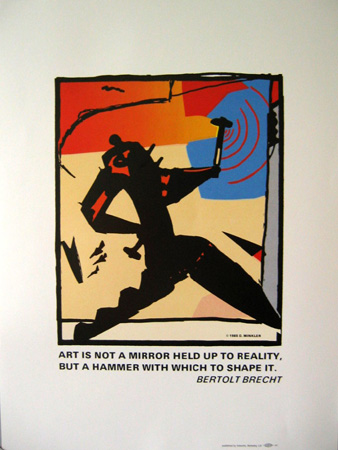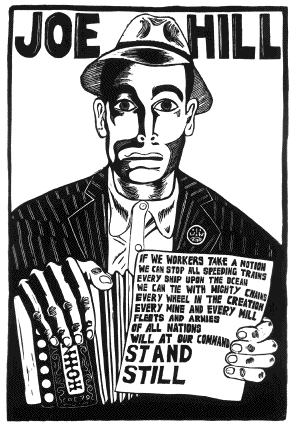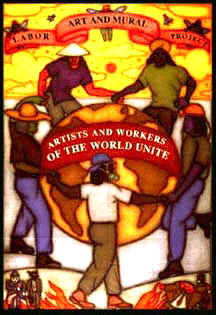WINDSOR LABOUR ARTS FESTIVAL 2008
January 30 through February 15

The Windsor Labour Arts Festival was organised to celebrate Labour Culture, the creative spirit of working people expressed in music, song, theatre, film, art, poetry, literature, dance that speaks to their daily lives, struggles, hopes and dreams.
"Our life is more than our work.
Our work is more than a job!"
- Charlie King, singer/songwriter
"I do not want art for a few, any more
than education for a few, or freedom for a few."
- William Morris, The Decorative Arts, 1877
"Art can raise man up from a fragmented
state into that of a whole being. Art enables
man to comprehend reality, and not only helps
him to bear it but increases his determination to
make it more human and more worthy of mankind.
Art is itself a social reality.Society needs the artist,
the supreme sorcerer, and it has a right to demand
of him that he should be conscious of his social function."
- Ernst Fischer, The Necessity of Art
__________________________________________________________
FESTIVAL EVENTS
ALL EVENTS OF THE WINDSOR LABOUR ARTS FESTIVAL ARE FREE TO THE PUBLIC:
Wednesday, Jan. 30, 7:00 pm
at the Macpherson Room, Alumni Centre 750, Sunset Ave.
FILM: “10,000 BLACK MEN NAMED GEORGE”
In the 1920s, the right of workers to join a labour union was still considered an open question and if you were poor and Black it was virtually impossible. You could forget about being called by your real name--all Black porters were simply called "George" after railyway owner George Pullman. This is the story of the courageous Black men and women who stood up in the face of exploitation and racism to form the first Black union in North America.
Friday, Feb. 1, 8:00 pm
at MILK COFFEE BAR, 68 University Ave. W.
THE BOILING POINT! OPEN MIC POETRY & MUSIC
An open-mic evening open to all workers, students, activists, poets, artists and musicians to vent music and poetry about about work and society, labour, the crisis in Windsor, Canada and social concerns across the world. Do you have a poem or song (original or not) that you want to share? Then come and join us. Find your voice and use it. Use your voice and find it.
Wednesday, Feb. 6, 7:00 pm
at the Macpherson Room, Alumni Centre, 750 Sunset Ave.
FILM: "SHUT UP AND SING" Starring: The Dixie Chicks
What happens when you’re sitting on top of the music world with record breaking recording sales, but you dare to criticize President George W. Bush? During one performance the lead singer of The Dixie Chicks makes a critical comment about George Bush and all hell breaks loose. The music industry turns its back on the trio, radio stations refuse to play their songs, journalists and music pundits declare that the Dixie Chicks are traitors to their country and supporters of terrorim. BIG corporate business is found wanting. The Dixie Chicks are not silenced and they return with explosive insights to music, life and politics.
Thurday, Feb. 7, 7:30 pm
at the Art Gallery of Windsor, 401 Riverside Drive West
CORPORATE WASTELAND :
THE LANDSCAPE & MEMORY OF DEINDUSTRIALIZATION
David Lewis, whose photographs comprise Corporate Wasteland, the exhibition held at the Art Gallery of Windsor from February 8 through April 6, will give a talk about his work at the Art Gallery of Windsor.
Corporate Wasteland is an exhibition created by internationally acclaimed photographer David W. Lewis and historian/curator Dr. Steven High and focuses on stark abandoned North American industrial landscapes and memories of job loss in Northern Ontario and parts of the United States . This collection of photography of corporate tombstones is supplemented by the commentary of the people who spent their lives working at these sites and who were affected by the plant shutdowns.
Friday, Feb. 8 – 23, 7:30 pm
at ARTCITE INC., 109 University Avenue. West
“BOILING POINT”
LABOUR ARTS FESTIVAL ARTCITE EXHIBITION and RECEPTION
See Artcite website for further details: http://www.artcite.com
Sunday, Feb. 3, 2:00 pm
at the Moot Court, University of Windsor Law Bldg. (corner of Sunset Ave. and University Ave. West)
FILM: “THE WOBBLIES”
In 1905, unionists, radicals, rebels, socialists, anarchists gathered together to form the Industrial Workers of the World, the One Big Union that would give voice to the voiceless, organize the unorganized to challenge the political and economic foundations across North America. THE WOBBLIES investigates a nation torn by naked corporate greed and the red-hot rift between the industrial masters and the rabble-rousing workers in the field and factory. Replete with gorgeous archival footage, the film pays tribute to workers who took the ideals of equality and free speech seriously enough to die for them.
Sunday, Feb. 10, 2:00 pm
at Moot Court, University of Windsor Law Bldg.
FILM: “LAND AND FREEDOM - TIERRA Y LIBERTAD”
It is Spain in 1936. The workers and peasants have already begun the sweeping process of revolution. Workers have seized the factories and peasants collectivize the land. Political parties vie for power in the republic. The right-wing responds with the fascist General Franco to drown the revolution in blood. This internationally acclaimed film from England focuses in the role of a young English worker who signs up to join the International Brigades in order to fight fascism and support the Spanish workers in their struggles. He is swept up in the debates that rage between men and women workers fighting against fascism and for a new way of life.
Wednesday, Feb. 13, 7:00 pm
at the Macpherson Room, Alumni Centre, 750 Sunset Ave.
FILM: "ARGENTINA - HOPE IN HARD TIMES"
What would you do if you lost your job, they closed the banks so you couldn't access your savings, and the government seemed unable to help? In Argentina they stormed supermarkets for food; the police gunned down 30 people in just one day. But what happened next was truly extraordinary. This movie allows the workers in Argentina to speak for themselves and joins them in the processions and protests, attends street-corner neighborhood assemblies, visits workers' cooperatives and urban gardens, taking a close-up look at the ways in which Argentines are picking up the pieces of their devastated economy and creating new possibilities for the future. The message of the workers is a powerful antidote to today's neo-liberalism.
Friday, Feb. 15, 9:00 pm
at The Kildare House, 1844 Wyandotte St. East (corner of Kildare Rd.)
FANNING THE FLAMES OF DISCONTENT
Three talented and acclaimed Windsor musicians - Len Wallace, Clinton Hammond, and Kenneth MacLeod - present an evening of music to stir the soul and tell the stories, histories, dreams and struggles of labour in music in song. Len Wallace is a songwriter, storyteller and inheritor of the folk and world music tradition when it comes to the history of working folk. Clinton Hammond is a popular singer, guitarist and actor known for his powerful and innovative performance. Kenneth MacLeod is a performer, and fiddler in the Cape Breton tradition with foot stomping music. Join us in an evening of songs, music, stories and jokes meant to comfort the afflicted and afflict the comfortable.
OUR ART IS OUR LIFE
by Len Wallace
"It is therefore through culture that the individual acquires standing and
actuality." - G.W.F. Hegel
There once was a time when the worker was an artisan and created a product or provided a service, from beginning to end. The creation was a thing of use and could be a thing of beauty. The rise of industrial capitalism, factories, mass production, the cheapening and deskilling of work and of the worker, as noted by William Morris and the pre-Raphaelite movement, put an end to that.
Art in, the broadest meaning of the word (involving music, poetry, painting,
sculpture, singing, storytelling, etc.), is not seen as a part of our nature, the thing that makes us human. It is suppressed. It has become increasingly viewed as something produced by others and a thing we buy. In a world that devalues work a the very level of production and devalues the worker for the very fact that he or she is a worker, it is natural that people do not give it consideration.
Artists too have entered the ranks of the wage workers and are subjected to the
rigours of technological change, automation, deskilling and devaluing of their labour. Art has become another commodity for sale like any other and the sheer necessity of selling one's labour power in order to eat has erased the lines between the industrial worker, the public service employee and the artist. The line between wage worker and artist has been blurred - "I'm an actor. I only work as a waiter just to pay the bills!", or "Yeah, I work on the line at Chrysler's, but I love playing music on the weekends".
Despite the infringement of wage work into almost every moment of our daily lives (from the workplace, to leisure, to entertainment, to watching television, shopping, rest periods) workers have expressed themselves about their work and the relations between people in the workplace.
Lawrence Levine, in his study of the songs of Black slaves in the Americas
wrote:
"For all its horrors, slavery was never so complete a system of psychic assault that it prevented the slaves from carving out independent cultural forms. It never pervaded all of the interstices of their minds and their culture, and in those gaps they were able to truly create an independent art form and a distinctive voice."
The same can be said for the working class and labour art. The "Labour" in labour art not only means organised labour. It means work, the workplace, paid and unpaid workers, union and unorganised, skilled, unskilled, blue collar, white collar, pink collar and no collar workers. In essence, it means the self-expression of the working class. It cannot be produced or manufactured by decisions of so-called "experts", by corporate owners, directors and management.
Why is labour art important? Because ti tells us something about ourselves - that we are not just producers of commodities, of so-called goods and services. The
struggles of workers for better conditions of work, for dignity and for fundamental change have never been simply struggles at a purely economic and political level. They find expression at the cultural level. If art is one of the defining things that makes us human, then the art expressed by workers and for workers is part of the struggle.
Can art, culture change the world. No. And Yes! As Stephen Duncombe noted in
his introduction to Cultural Resistance Reader, "Culture is pliable; it's how you use it that matters."
One has only to view the recent television Christmas ads of The Gap - "Peace -
Love - The GAP!" or the Bank of Montreal using Bob Dylan's "Times They Are
A-Changing" to see how culture has been used as a device for hip marketing. One can readily distinguish the production of statist culture and art that manufactured consent through allegiance to state ideology, various nationalisms, the "volk", the "people". And one can compare them to the power of workers' songs such as Ralph Chaplin's, "Solidarity Forever", the Portuguese "Uma Gaivote", the Yiddish "Un Du Akerst" with their power to strengthen, empower and subvert.
Because it is the independent expression of workers about something so fundamental as THEIR view of work and the world they create, it can be subversive. That's why you won't see it on television, read about it in corporate owned newspapers and hear it on corporate owned radio.
For details about the Festival, pick up one of the many brochures around town. Visit our website at http://labourartsfest.tripod.com. Email me at lwallace@mnsi.net or call the Labour Studies program at the University of Windsor, 519 253-3000 Ext. 3723.
SPONSORED BY: LABOUR STUDIES PROGRAM, UNIVERSITY OF WINDSOR
With the support of ARTCITE INC. and the ART GALLERY OF WINDSOR
ENDORSED BY: WINDSOR & DISTRICT LABOUR COUNCIL

Festival Goals:
1. To provide a forum for the study, presentation, exploration and promotion of all facets of Labour Arts and Labour Culture;
2. To revitalize the notion that workers historically through their own self-activity had and continue to have an independent and unique view of social reality. Workers are not merely producers of commodities, goods and services. They are the creators of their own art and culture.
3. To promote the view that culture cannot be manufactured and given to people. It is something that comes from the ground up and intrinsic to community.
4. To build bridges and a sharing of ideas and activity between workers, academics, artists, intellectuals, students.
5. To gain new insights, explore new truths and discover new ways of thinking about work, worker's lives and our society.
__________________________________________________________
"You don't know where you're going unless you know where you've been.
- Utah Phillips, singer, songwriter, poet, cultural worker, IWW bard
__________________________________________________________

What is Labour Art/Culture?
It is Art (literature, poetry, painting, cartooning, publishing, music, songs, dance, theatre) that challenges the notion that Art and Culture is made by others to be bought and sold as another commodity in the marketplace.
It is Art that preserves a history not often found in textbooks about workers' struggles, hopes and dreams.
It is Art with a vision not only of how workers view themselves and their present and past condition, but about workers building and transforming the world around them.
It is Art that challenges mainstream pop culture because it brings the forefront the important and too often ignored notion of social class as fundamental to people's daily lived experience.
Links to other Labour Arts/Culture Sites
FESTIVAL CONTACTS
Email: WINDSOR LABOUR ARTS FESTIVAL Email
EVENTS CO-ORDINATOR:
LEN WALLACE Email
__________________________________________________________
Len Wallace


